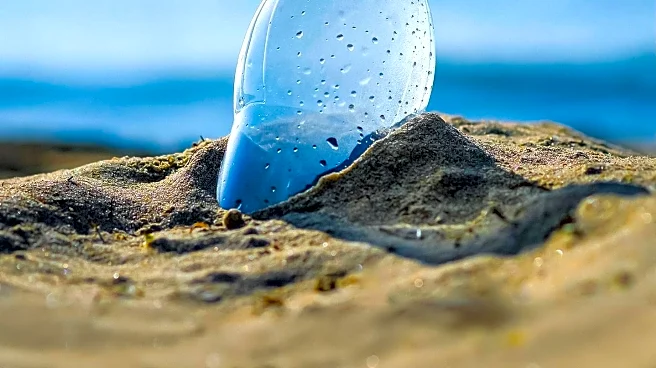What is the story about?
What's Happening?
Recent research has revealed significant health risks associated with the consumption of bottled water due to microplastic contamination. The study, led by Sarah Sajedi and published in the Journal of Hazardous Materials, indicates that individuals who consume bottled water ingest significantly more microplastic particles compared to those who drink tap water. These microplastics, which are tiny plastic particles ranging from one micron to five millimeters, are released from the bottles during manufacturing, storage, and transportation. The research highlights that these particles can enter the human body, potentially causing chronic inflammation, oxidative stress, hormonal disruption, and other health issues. Despite the growing concern, the long-term effects of microplastic ingestion remain poorly understood due to limited testing and measurement methods.
Why It's Important?
The findings underscore the urgent need for increased awareness and legislative action to address the health risks posed by microplastics in bottled water. While some governments have implemented measures to reduce plastic waste, these often focus on items like bags and straws, neglecting the widespread use of single-use water bottles. The study suggests that education is crucial in mitigating these risks, emphasizing that bottled water should be reserved for emergencies rather than daily consumption. The potential health implications of microplastic ingestion could have significant impacts on public health policies and consumer behavior, prompting a reevaluation of plastic use and waste management practices.
What's Next?
The research calls for more comprehensive studies to better understand the health impacts of microplastics and to develop standardized methods for their detection and measurement. It also highlights the need for policymakers to expand legislative efforts to include single-use water bottles in plastic reduction initiatives. As awareness grows, there may be increased pressure on manufacturers to improve the quality of plastics used in bottles and to explore alternative materials. Additionally, public health campaigns could play a vital role in educating consumers about the risks associated with bottled water and promoting safer alternatives.
Beyond the Headlines
The study raises broader questions about the environmental and health impacts of plastic consumption, highlighting the interconnectedness of waste management, public health, and consumer habits. It suggests a potential shift towards more sustainable practices and materials, which could drive innovation in the packaging industry. The research also points to the need for global cooperation in addressing plastic pollution, as microplastics are a pervasive issue affecting ecosystems and human health worldwide.


















